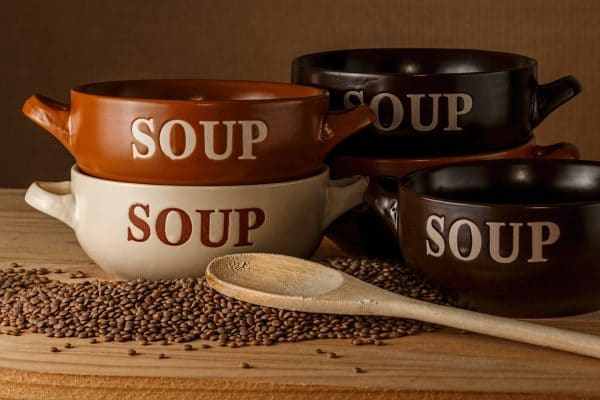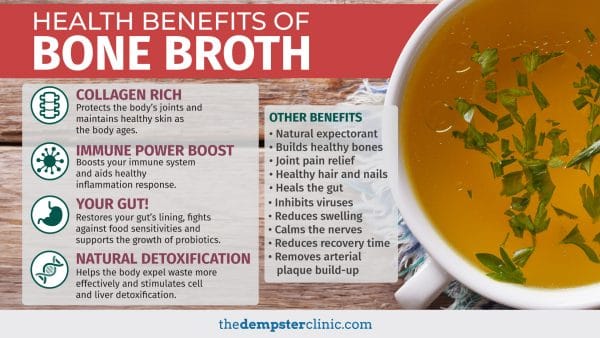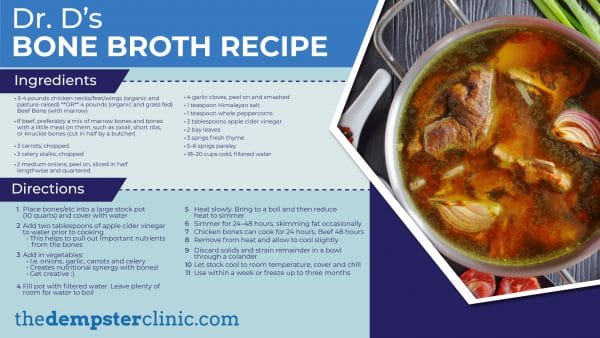Digestive problems can be debilitating to deal with, so it’s no surprise that finding solutions is a booming industry. If you’re familiar with the world of functional health, you may have heard of the purported wonder properties of bone broth. But is the brew all it claims to be? While I’ve written before that bone broth has impressive potential as an anti-aging food, you might be surprised to learn about the positive difference it can make for your gut health, too.
Whether you’re a long-time fan of bone broth or have never heard of it until now, there’s a lot you can learn about how it can be the answer to your gut problems.

What is Bone Broth?
Bone broth is as simple as it sounds. In short, it’s a clear soup brewed from animal parts that are nutritious but difficult to eat, like bones, marrow, skin, tendons, and ligaments. The broth often consists of herbs and vegetables as well for flavouring. You can make bone broth by slow-simmering any combination of the previously mentioned ingredients for several hours (even days) until the water forms a thick stock that is filled with healing compounds like collagen, glycine, glutamine, and proline.

You’re spot on if you have noticed that bone broth makes food out of otherwise wasted ingredients. In fact, bone broth has been a smart way to extract more nutrition from meals for thousands of years, but only recently has this staple food gained widespread attention. Some cities are even opening bone broth shops to meet the demand. Is bone broth just a fad, or should you find ways to drink some regularly? Let’s take a closer look at what it delivers to your digestive system.
The Digestive Benefits of Bone Broth
Bone broth earned the nickname “nature’s multivitamin” for a reason; it’s impressively beneficial for your body. In fact, this broth is one of the most nutrient-dense foods available, making it an ideal way to resolve digestive issues.
Each serving of bone broth provides your body with 19 essential and non-essential amino acids that are used to build proteins. Even so, the biggest benefits might be how bone broth improves the functioning of your digestive system.
Bone broth benefits for digestion begin with one key ingredient. The soup is an optimal source of collagen, a protein that forms the tissue that lines your gastrointestinal tract. The collagen in bone broth can both strengthen and improve the functioning of mucous membranes, preventing small gaps from forming that allow chemicals and food particles to leak out into the bloodstream. Consequently, consuming adequate amounts of collagen reduces your risk of developing Leaky Gut Syndrome, Crohn’s disease, acid reflux, and Irritable Bowel Syndrome.
In fact, research shows that people with chronic IBS produce less collagen naturally, so taking it in through their diets is integral for maintaining healthy levels. These natural compounds will generally enhance the digestive process so that you suffer less from stomach problems like bloating, diarrhea, acid reflux, and constipation.

Collagen also produces gelatin, which is a thick substance that helps your digestive system deal with foods that might otherwise trigger allergies or sensitivities like lactose and gluten. Bone broth gelatin contains amino acids like arginine, glutamine, and glycine that work to promote probiotic balance and break down proteins for synthesis, both minimizing the signs of aging skin and decreasing your risk of developing an autoimmune disorder.
13 Benefits of Drinking Bone Broth
Even if your digestive system works correctly, there are plenty of reasons to consider incorporating bone broth into your life, including the following:

1. Regular servings provide your body with stronger immunity against illness and diseases.
2. Bone broth promotes healthier joints and tendons, thanks to the presence of minerals like calcium, glucosamine, magnesium, phosphorus, and silicon.
3. The collagen in bone broth reduces your risk of developing wrinkles by keeping your skin more firm so that it doesn’t sag.
4. Drinking bone broth promotes the development of stronger, healthier bones in children.
5. Bone broth reduces inflammation in the respiratory system, helping you recover from congestion. That’s why chicken soup is a common cold remedy.
6. This broth helps the liver reduce your body’s toxin load from environmental toxins, pesticides, and artificial ingredients that you are exposed to everyday.
7. Bone broth lowers oxidative stress to support cellular detoxification.
8. Drinking bone broth helps eliminate fat-soluble compounds like toxic heavy metals in your body tissues.
9. Bone broth amino acids help regulate gene expression, DNA synthesis, and cell regeneration.
10. Regular servings of bone broth will keep your electrolyte levels high, reducing the risk of imbalances that lead to fatigue, brain fog, muscle spasms, and general moodiness.
11. The amino acids in bone broth fortify muscles, making it a perfect post-workout drink.
12. Bone broth amino acids can act as inhibitory neurotransmitters to produce chemicals that aid normal functioning and promote better sleep, less anxiety, more motivation, and improved mental performance.
13. Natural bone broth promotes better intake of calcium, phosphorus, magnesium, potassium, and other minerals. Bone broth provides your body with magnesium, a vital mineral renowned for decreasing headaches, muscle spasms, and digestive problems.
Tips for Making Quality Bone Broth
The health benefits of bone broth are hard to pass up, so you’re normal if you’re starting to wonder how you’ll respond to it. The best way to find out is to try some for yourself, but this involves knowing where to source your bone broth.
Store-bought broths rarely contain as many nutrients as they could, as most consist of more lab-produced meat flavouring and monosodium glutamate (MSG) than animal-derived ingredients. This means that you’re often best off making your own instead. Don’t worry, it’s a lot less complicated than it sounds.

The key to success with bone broth is starting with the right ingredients. For maximum nutrition, make sure you source animal parts that aren’t regularly eaten, like the bones, feet, and neck of poultry, pork, and beef. Pasture-fed, antibiotic-free animal sources are best. You will boost the nutritional content if you incorporate vegetables into the stock as well.
Want an easy solution for sourcing ingredients for homemade stock? Save up the “throwaway parts” from your vegetable cuttings and meaty meals in the freezer until you have several freezer bags worth. Then you can make a large batch at once and store the broth for later use.
Recipes abound online for homemade bone broth, but the essential process involves boiling bones on the stove in a large stockpot with a few tablespoons of apple cider vinegar to pull out the nutrients. Let the mix simmer for at least six hours or as long as 48, adding vegetables like onions and celery for the last few hours to boost the vitamin content.
After cooking, strain the solids from the broth and store it in the fridge or freezer. As it cools, the liquid will form a hardened fat layer on top that keeps the soup from spoiling. You should discard this layer only before consuming the broth to keep it fresh longer.

Should You Try a Bone Broth Fast?
While you can experience many of the benefits of bone broth from merely starting your day with an eight-ounce serving, it’s also possible to enhance the value for your health by following a short-term bone broth fast. Following the fast means that for two or three days in a row you drink bone broth on a regular basis and little (if any) other food.
When done safely, a bone broth fast can help you maintain a healthy weight, normalize your blood sugar levels, reduce your risk of a multitude of chronic diseases, and even regulate your hunger hormones so that you feel full longer. Fasts aren’t for everyone though, so if you find that restricting your calories compromises your quality of life too much, it’s best to supplement your regular diet with bone broth instead.

The best candidates for a bone broth fast tend to have the following characteristics:
- Regularly suffer from food allergies and sensitivities
- Have signs of low immune function, like frequent bouts of illness
- Have a previous history of digestive disorders like SIBO or Leaky Gut Syndrome
- Regularly suffer from digestive problems like bloating, gas, or constipation
- Experience adverse reactions to medicines
- Suffer from joint pain or arthritis
In contrast, if you have hypoglycemia, are pregnant or breastfeeding, medically underweight, or are recovering from an illness, you shouldn’t attempt any type of fast without talking to your primary healthcare provider first.
The best way to complete a bone broth fast is to drink three or four quarts of high-quality broth each day for at least three days. Any shorter and the fast is less likely to kill off gut bacteria and repair your GI tract effectively. Most people prefer to drink bone broth warm, so consider investing in a thermos so that you can keep it handy. If you find yourself feeling famished during the fast, permit yourself to snack on low-risk foods like raw fruits or vegetables.
Bone broth fasts are meant to be temporary, so plan to go back to your regular diet once you’ve finished, occasionally supplementing your meals with a cup of broth to keep your levels up. Some people find bone broth fasts to be a stellar way to jumpstart a new, healthier diet like the ketogenic diet.
No matter how committed you are to completing your fast, it’s important to practice common sense while doing so. Throughout the process, make sure you get plenty of rest and don’t overexert yourself physically. And finally, make sure you eat if you feel weak from hunger.
Get Health Advice at The Dempster Clinic- Center for Functional Medicine
Your diet and the health of your digestive system go hand in hand, which is why it’s so important to set up your meals for optimal health. One way to keep your nutrient levels better balanced is by regularly drinking bone broth. If you have further questions or want more information about healthy eating, please make an appointment with me at The Dempster Clinic- Center for Functional Medicine.
I am pleased to offer a Complimentary 15-minute Discovery Session for all potential patients. This session can take place over the phone or at the clinic in person. It provides an opportunity for you to learn more about the services I offer and how they can be of benefit to you.
Please schedule an appointment today! Your best health awaits.
Dr. John Dempster
The Dempster Clinic- Center for Functional Medicine


